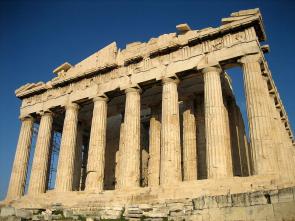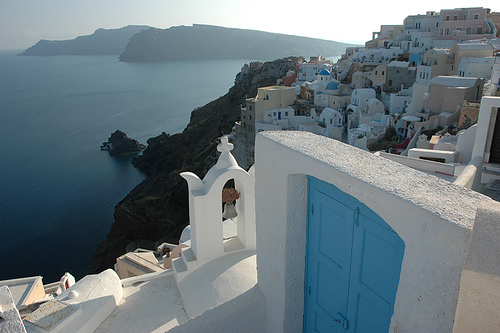It’s the birthplace of Western Civilization, where
democracy and political science, mathematics, Western thought, modern
literature, language, drama, and the Olympic games were created and developed. And
from there, they spread all across Europe and eventually the world. The Ancient
Greeks have contributed so much to the development of the world as we know it.
But what about the Greece of today? That’s what I want to know.
The Greeks themselves call their country Hellas or
Ellada. However, the term “Greece”
came from the Roman term for the country, Graecia. The term Hellas is also used
in English, as in the Hellenic Republic.
Greece lies between the Ionian Sea (which separates
Greece from Italy) and the Aegean Sea (which separates Greece from Turkey). It
also borders the countries of Albania, Macedonia, Bulgaria, and Turkey. The
country lies on a peninsula known as the Peloponnese Peninsula and also
includes 1200-6000 islands (depending on how you define an island apparently)
at the end of this peninsula, of which 227 are inhabited, the largest being
Crete. About 80% of Greece is either covered in mountains or hills, which means
there are no navigable rivers here. Mt. Olympus is the highest peak in the
country, the same peak the Ancient Greeks thought was where the gods lived. The
Vikos Gorge is noted as the deepest gorge in the world and many endangered
species use its natural protection as a refuge.
Some of the oldest artifacts of human existence in
the Balkans are Greek, which isn’t surprising seeing how the Ancient Greek
Civilization was one of the most advanced civilizations at that time. Greece
went through its own Dark Ages, which traditionally ends with the first Olympic
games in 776 BC. Homer’s Iliad and Odyssey also were written right around this time as well. During
this time, Greece was more or less made of a collection of city-states
spreading across much of the Balkans and the Peloponnesian Peninsula. It was a
thriving cultural center in all of Europe and much of the world as well — a
central hub for literature, language, architecture, drama, philosophy, science,
and mathematics. And in 508 BC, it became the world’s first democracy, the
model that much of Europe, the Americas, and many other areas of the world base
their government on. Greece entered a series of wars, battles, and oppositions
with the Persians, then with the Peloponnesian War between the Spartans and the
Athenians, the Goths, the Huns, the Slavics, the Franks, the Venetians, the
Serbs, and the Ottomans (Turks). They eventually were granted their
independence from the Ottoman Empire in 1829. They continued to have several wars with Turkey on into the
20th century. During
WWII, the Italians demanded Greece to surrender to them, but they fought
heroically and stood their ground against the Fascist Regime. Today, Greece is
a highly industrial country and one of the biggest tourist spots in
Europe. Greece joined the European
Union in 1981 and adopted the euro in 2001. Although Athens hosted the 2004
Summer Olympics, Greece was hit hard after the global economic crisis in
2008-2010.
Athens, the capital city, is one of the oldest
cities in the world; they’ve been continually inhabited for the past 7000
years! Athens itself has been the center for education and government. It’s
particularly famous for the Acropolis, the Parthenon, the Theatre of Dionysus,
Plato’s Academy, Aristotle’s Lyceum, and the Acropolis Museum. And actually you can go to the
Acropolis Museum for free. And by free, I mean, go to Google Maps, type in
“Acropolis Museum” and put it into streetview on top of the museum. You can
walk through the museum, and it gives you a great view of the Parthenon. I’ve
been to this museum several times this way. (I wonder what other museums Google
mapped?) With about 3.7 million
people in its metro area (slightly smaller than Los Angeles, California), it is
a crossroads between old and new, ancient Greek architecture standing next to
modern, energy-efficient buildings. Dotted with parks, gardens, museums,
shopping, sports arenas, theatres, and universities, Athens is every bit of a
modern city. Major highway
systems, rail and subway systems, and ferry systems make it easy to get to and
get around the city.
Greece’s economy is a high-income economy and
considered advanced. They generally rank high in terms of GDP (gross domestic
product) and PPP (purchasing power parity), an indication of their high
standard of living and ranking high on the Human Development Index. Roughly 85%
of their economy is service-based with tourism as one of their biggest economic
drivers. Greece was ranked as the 7th most-visited country in the
European Union and 16th in the world. Greece is ranked number one in
Europe’s production of pistachios and cotton; number two in rice production and
olives; number three in almonds, tomatoes, watermelons, and figs; and they’re
ranked fourth in tobacco production. And because of its coastal location, they
have a highly-developed shipping and fishing industry. Science and technology is a huge
industry in Greece. In fact, millions of women all over the world have a Greek scientist
to thank (or resent, rather). His name is Georgios Papanikolaou, and he came up
with the Pap smear. There have also been many Greek scientists who have made
contributions to the confusing world of physics and even more confusing world
of computer science. However, Greece fell into trouble after the 2008 global
economic crisis, and although they are slowly climbing out of it, they still
have one of the lowest credit ratings among EU countries.
By far, the most-adhered-to religion in Greece is
Eastern Orthodoxy, which is a part of the Greek Orthodox Church. Some 97-98% of
Greeks identify themselves as Eastern Orthodox. In comparison with other
countries in Europe, most Greeks take religion seriously. There are a small number of Turkish
Muslims (with Muslims from elsewhere included as well) who live in Greece. The
Greek city of Thessaloniki used to have a large Sephardic Jewish population at
the beginning of the 20th century, but after WWII, those numbers
dropped drastically. A small number of Roman Catholics and even Jehovah’s
Witnesses among others have followers in Greece.
The Greek language is the official language of
Greece; however, the question of whose dialect and which form (more classical,
scholarly Greek vs. what was spoken by the people) has been a constant source
of debate and dispute for centuries. In fact, this wasn’t resolved until the
mid-1970s when the government finally decided that the official language form
should be the language of the people. The literacy rate in Greece has more than
tripled since the 1950s. There are several other minority languages spoken in
Greece, which includes Albanian, Turkish, Bulgarian, Romani, Macedonian Slavic,
Aromanian, and Meglenitic. If you
look at a list of English-language prefixes and suffixes, many of these come
from Greek and Latin.
Greece has a ton of cool things about it: in light
of our recent (deplorable) election turnout, no one in Greece has the option to
stay home; it’s mandatory to vote. There’s a small chance that the next marble
statue you see is of Greek marble since 7% of the world’s marble comes from
here. There are actually some olive trees planted in the 13th
century that are still producing olives today! It’s no doubt that Greece is a
beautiful place to visit: they enjoy over 250 days of sunshine a year; it’s
lucky for them that they get to enjoy the sunshine longer than most people
since they rank 26th in the world for life expectancy. Greeks feel that waving with an open
palm is taboo, so they prefer to wave with a raised fist instead. Apparently,
the British poet Lord Byron was so head-over-heels about the Greeks, he went to
Greece to help them fight in their war for independence against the Turks,
where he later caught fever and died (they still consider him a national hero).
The word “barbarian” is a Greek word meaning anyone who didn’t speak Greek. To
counter that, I suppose this is where the phrase “It’s all Greek to me” came
from (Perhaps? Maybe?). Greeks generally have the lowest divorce rates yet the
highest abortion rates (makes you wonder if the two are related somehow).
Greece’s original currency, the drachma, was the oldest in Europe, reaching the
fine old age of 2650 years (it was replaced by the euro). So, I think I’ll get
some feta cheese, some kalamata olives, watch My Big Fat Greek Wedding again, and look forward to some real Greek
food in about a week.
Up next: art and literature


.jpg/500px-View_of_the_Acropolis_Athens_(pixinn.net).jpg)




No comments:
Post a Comment